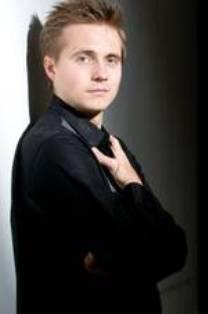
Petrenko Compelling in All-Russian Debut
“Russian Rhapsody”
was the tag for Friday night’s Cincinnati Symphony concert at Music Hall.

And rhapsody it was, with a radiant performance of Rachmaninoff’s popular Rhapsody on a Theme of Paganini by pianist Jon Kimura Parker and the CSO.
But the concert was more than that – much more -- since it marked the CSO debut of guest conductor Vasily Petrenko.
Russian born Petrenko, 32, who as music director of the Royal Liverpool Philharmonic has reportedly given the Liverpudlians their biggest jolt since the Beatles, presided over an all-Russian program that also included Shostakovich’s Symphony No. 8.
Few who heard his
performance are likely to forget it soon.
Born and trained in
He brought those insights and a lithe, expressive conducting style to the CSO, which rewarded him and the audience with a rapt, engaged performance.
Shostakovich described his Symphony No. 8 as a “requiem,” not just for the victims of World War II, but of the Soviet regime, which, once the war ended, resumed its brutal treatment of the Russian people (including Shostakovich himself, whose “pessimistic” music was banned in 1948).
The symphony is in five movements. The opening Adagio, nearly half the length of the entire work, begins like the composer’s Symphony No. 5, with a muscular, dotted rhythm attack by the cellos and basses, followed by a plaintive violin melody, later taken up by low flutes. Petrenko built the movement to hair-raising intensity, with hollow snare drum attacks, harsh, shrill effects in the winds and a pile-on of percussion at the climax. English hornist Christopher Philpotts resumed the lament with an achingly beautiful solo before the music trailed off to a “Taps”-like conclusion by muted trumpet (principal Robert Sullivan).
The second movement, an Allegretto, mimics a victory march. This is belied with mocking winds and brasses, a needle-stuck-in-the-groove-type ostinato and low-lying contra-bassoon blasts, all tellingly delivered by Petrenko and the CSO musicians.
The third movement “scherzo” was writ in horror, beginning with pounding quarter-notes in the violas, overlaid with clarinet and oboe “screams” terminated by sharp trumpet cutoffs and hammer blows in the basses. There was a moment of nose-thumbing, muted trumpet a la Stravinsky’s “Petrouchka,” followed by sharp snare drum reports (David Fishlock). Everyone had a turn at the quarter-note juggernaut, including the trombones, the violins (with coolly legato bowing) and timpanist Patrick Schleker. It all culminated in a violent explosion, which introduced fourth movement. Here the mood was despair, with a threnody by the strings, the inevitable forlorn piccolo solo and eerie flutter-tongued flutes over a recurring bass line.
Magically, the clouds parted in the finale where the bassoons (Martin James and Hugh Michie) frolicked a bit before the tragedy of the first movement returned and Shostakovich inserted a few sardonic licks. It is ambiguous music, uncertain whether to be happy or sad, and Petrenko and the CSO played it that way, first desk players offering various quizzical commentary. It did resolve, however -- tenderly so in soft, pizzicato chords, evocative of hope.
Parker drew an
enthusiastic ovation for the Rachmaninoff Rhapsody, which he performed with
gem-like color and transparency thoroughly abetted by Petrenko and the CSO. The famous 18th variation breathed
romance and as Parker sounded the emphatic ending, he spun off the piano bench
onto the podium where he embraced Petrenko.
Responding to the applause, Parker played “the most elegant piece of
Rachmaninoff I know,” Prelude in G Major.

The concert opened with a brisk, tasty reading of the Overture to “Russlan and Ludmilla” by 19th-century Russian nationalist Mikhail Glinka.
Repeat is 8 p.m. Oct. 4 at Music Hall.